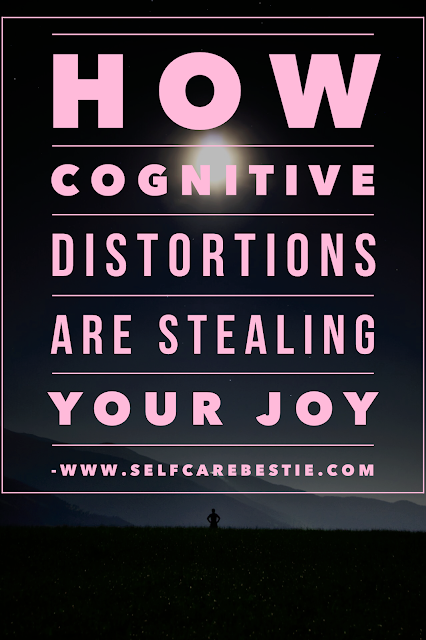Wahoo for Friday, right?! My fam has got a busy weekend, full of fun plans, and the weather is going to be nice and warm, so I’ve got all the happy feels up in here!
Before I sign off for the weekend, I want to leave you with a post that addresses cognitive distortions. Cognitive distortions are exactly what they sound like…just ways of thinking that are a bit messed up or distorted. The most important thing to remember about cognitive distortions is that everybody has them. I mean everyone. You, me, all therapists, yes, even Brene Brown. 😉
So when you’re reading this post and you begin to recognize the cognitive distortions you struggle with, please don’t be alarmed. You aren’t going crazy. We all are (that was a joke, Besties!).
Although everyone you know deals with their share of these distorted thought patterns, that doesn’t make them any easier to deal with. In fact, cognitive distortions can do a ton of damage to your peace of mind and your relationships with others if they go unchecked.
Allow me to give you a few examples of common distortions and you’ll see what I mean:
“Nice picture of my friends hanging out without me on Instagram. They always leave me out.” (all-or-nothing thinking)
“I could work all night every night this week and there’s still no way I’ll ever get everything done.” (catastrophizing)
“My husband is so quiet tonight, what’s with him? He must be really mad at me about something.” (mind reading)
“I feel like my own best friend doesn’t want me to join her book club.” (emotional reasoning)
“Ugh…every time I look at my sister’s Instagram feed, I feel like the worst mom in the world. Her kids are always so smiley and happy and her house is always so clean and perfect. I’ll be lucky if my kids get a bath tonight and the dishes get done.” (comparing and contrasting)
“I should be feeling better by now…I’ve been on meds for my depression for a week!” (“should” statements/perfectionism)
Do you see how cognitive distortions are just absolute joy-suckers? UGH. Seriously, they are like the Eeyore of cognition. Ain’t nobody got time for that. So let’s chat about a few ways to overcome this type of thinking.
First, look at the above examples. Which type of distortion do you find yourself falling prey to most often? Are there certain people you always compare yourself to? Are there certain situations in which you always feel self-conscious? Do certain people cause you to feel helpless or hopeless?
Once you have an idea of where you struggle the most with cognitive distortions, you can
begin to challenge them. Start by thinking about how you feel in those difficult situations or with those difficult people. What is it about that situation (or people) that is triggering you in some way? As I told you
here, Brene Brown says we often tell ourselves stories, parts of which are totally fabricated because our brain is seeking a
story, not necessarily the
truth. When you feel intense emotion, pause and ask yourself why. Challenge yourself to stick to the truth and nothing but the truth, and watch as your peace increases and your relationships improve.
And also: gratitude. The longer I’m a therapist, the more I’m convinced that gratitude may actually be the answer to everything. But here’s the thing: Look at all of those distortion examples again. Every single one of them can become less powerful thoughts, simply by practicing gratitude. Being thankful for the last time you did get to hang out with your friends, that you have a job, that your husband is quiet (haha, JUST KIDDING! I’m full of jokes today!), that you have a best friend, that your kids are healthy and you have a roof over your heads, that you are finally getting treatment for your depression…can help you feel like things are more balanced than you initially viewed them. Through the lens of gratitude, our burdens become blessings, our loads become a bit lighter.
Let’s start calling ourselves out when we notice our cognitive distortions. Brene likes to call it “getting curious about your emotions.” I love that. For most of us, we didn’t grow up challenging our thoughts or being curious about our emotions. But the good news is, it’s never too late to start.
Have a wonderful weekend, my friends!
#mc_embed_signup{background:#fff; clear:left; font:14px Helvetica,Arial,sans-serif; width:100%;}
/* Add your own MailChimp form style overrides in your site stylesheet or in this style block.
We recommend moving this block and the preceding CSS link to the HEAD of your HTML file. */
Sign up for a FREE 65 Suggestions For Self Care Printable!

[…] And that’s when it hit me: my husband had just CBT’d me! Cognitive Behavioral Therapy (CBT) is the main way I teach people to overcome anxiety. […]